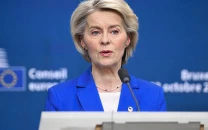Obama on Pakistan
Public statements made by US President Barack Obama on Pakistan need to be evaluated.

Obama’s statements on Kashmir are equally important. As far back as November 2008 he suggested that the US should help resolve the Kashmir dispute so that Pakistan can focus on hunting down militants. He said he would send a “Special Envoy on Kashmir” which never happened. In his article in Foreign Affairs in 2007 he wrote: “If Pakistan can look towards India with confidence, it will be less likely to believe that its interests are best advanced through cooperation with the Taliban.’’ This logic is bound to result in little progress on condemning Indian human rights violations in Indian-Administered Kashmir.
Obama also said: “The civilian government is very fragile and doesn’t seem to have the capacity to deliver basic services...it’s difficult for them to gain the loyalty of their people.” This has weakened our government’s credibility and its relevance to US policies. And frankly, Obama’s envoys like Holbrooke have done him no service by openly defending the corruption of leaders of both Afghanistan and Pakistan.
There is recognition of Pakistan’s improved nuclear security regime. However, it is clear that there is a possibility that terrorists can access our nukes and this undermines any equitable AfPak approach. “We know that extremists seek nuclear weapons. We want to respect their sovereignty but we have huge strategic interests in making sure that Pakistan is stable and doesn’t end up a nuclear-armed militant state.”
Nearly one year after the heated debate over the signing away of our sovereignty through the Kerry-Lugar Bill, the government has neither received a significant proportion of the funds nor has been accorded a corruption free rating. Our international indicators on transparency, business competitiveness, media freedom and law and order are at a dismal low. And the tone of Obama’s public statements doesn’t treat Pakistan as a dignified ally in the war on terror. Recognition of exactly how low the graph has become is urgently required for us to regain our dignity.
Published in The Express Tribune, June 23rd, 2010.












1724319076-0/Untitled-design-(5)1724319076-0-208x130.webp)






COMMENTS
Comments are moderated and generally will be posted if they are on-topic and not abusive.
For more information, please see our Comments FAQ